General
Tribute to Prof. Livingstone S. Luboobi: Servant leader, Mentor, Father Figure and Role Model
Published
7 months agoon
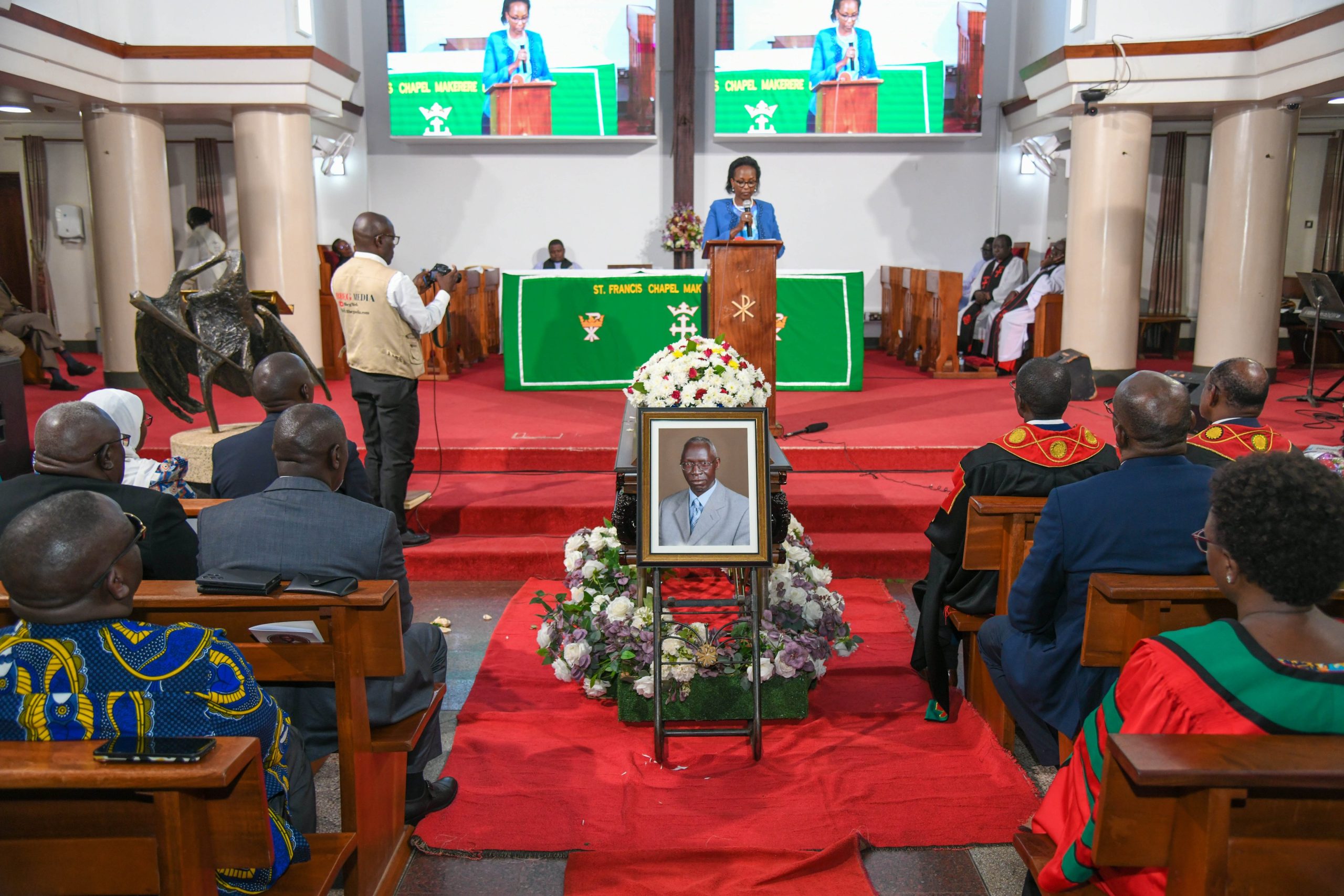
Professor Livingstone Sserwadda Luboobi, on 16th July 2025, you have completed your earthly journey, and you are returning to the Almighty God, your creator. It is very painful to lose you, my mentor and role model. I will find solace in your impactful legacy. I am comforted that you will live on, through the countless lives that you touched, inspired and mentored at the national and international levels.
To God be the glory, for a life well lived (25th December 1944 to 16th July 2025). A genuine human being with a pure heart. A life of good works to humanity filled with simplicity, empathy, love, respect, generosity, wise counsel and guidance, and compassion. You have been a true embodiment of the scripture in Matthew 22:39, love your neighbor as yourself.
Professor Luboobi, you were one of a kind. You have been God’s perfect gift to humanity. A very intelligent and distinguished mathematician who served as the Vice Chancellor of Makerere University from 2004 to 2009. You believed that every individual had a contribution to make in the transformation of Makerere University. I am grateful to God that I met you in the course of my academic journey, a blessing that presented me with a rich and rewarding experience that solidified my career path.
Meeting Greatness
Reflecting on my career and life journey (2004 to date), I was blessed to work with Professor Luboobi during his tenure as Vice Chancellor. I met Professor Luboobi in 2004, when I was a student pursuing a Bachelor of Mass Communication degree at Makerere University. It was in the morning hours, as he headed to the Office of the Vice Chancellor, walking along that path of the then Faculty of Arts to the Main Building. I was coming out of a lecture at the Faculty of Arts, and rushing to catch another lecture at the Faculty of Social Sciences.

A few months earlier, I had read about him as the Vice Chancellor of Makerere University in one of the newspapers. When I glanced at him walking along the same path, he stopped, and greeted me with a smile. I responded to the greeting. After the greeting, I became speechless. He volunteered to continue the conversation, with a question, “Which course are studying at the University?” I responded-Bachelor of Mass communication. And in a minute, he passed on a word of counsel, enjoy your studies and remember to read and excel. I was meeting him for the first time, but he used that minute to pass on words of wisdom. I was filled with joy that I had met and greeted the Vice Chancellor, and little did I know, that I one day, I would work directly under him.
As luck would determine, the then Public Relations Officer of Makerere University, Ms. Helen Nanteza Kawesa joined the Department of Mass Communication to teach one of the course units. Ms. Nanteza Kawesa assigned us work, and I scored 29 out of 30 in the coursework. After the lecture, she requested to meet that particular student who had scored that mark. I interacted with her, and later, I was presented with an opportunity to join Makerere University Public Relations Office for internship.
When I reached the Public Relations Office, I was introduced to the staff in the Office of the Vice Chancellor. Ms. Nanteza Kawesa also introduced me to the Vice Chancellor as a student intern who was joining the Public Relations Office. He was seated in his Chair, but he stood up, shook my hand, and with a smile, welcomed me to the Office of the Vice Chancellor. He said: “You are going to add value to the Office of the Vice Chancellor.” I felt so nice and empowered.
The following morning, Professor Luboobi presented to me a note in his very nice hand-writing: “I am certain that you are that little girl, I once met and interacted with briefly at the Faculty of Arts as I headed to my office. I did not know that a year later, you would join the Office of the Vice Chancellor, I am extremely pleased that you have joined the Public Relations Office for internship. Feel free through your immediate supervisor to participate in every activity or program undertaken by the Office.”
I read that note a number of times, and I would recall, the phrase from the Vice Chancellor, assuring me that I was going to add value to the Office. He was a source of inspiration.
During my internship, I observed that Professor Luboobi was very intelligent, but down to earth. He embodied the true qualities of a servant leader. He was people-centred and inclusive. In the staff meetings, Professor Luboobi was always calm. He accorded his staff and the student intern, an opportunity to contribute ideas on the different topics or issues that were being discussed. He was a principled and exemplary leader. He was honest and a person with the highest degree of integrity and morality. He was a team player, and he exercised an open door policy. In his presence, we felt safe, valued and respected. He believed in the team that he led, and presented each member of staff with an opportunity to shine.
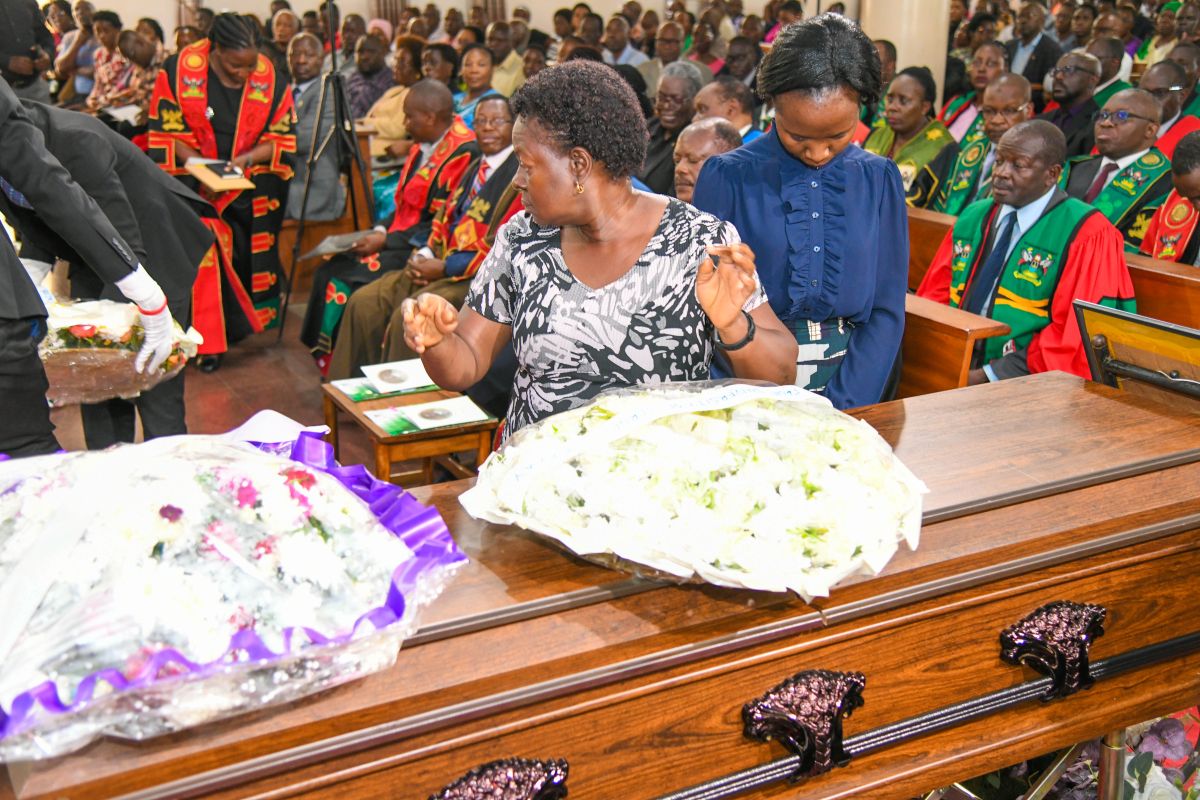
Professor Luboobi appreciated the contribution of his staff. There was cohesion and we felt a great sense of belonging. As I completed my internship, I was strongly convinced that in Professor Luboobi, I had met a father figure and role model. He closely monitored my academic performance, and I knew that I had no room not to excel.
On completion of my studies, I felt that I should return to the Public Relations Office to volunteer as I applied for jobs in other organisations. When the PRO presented my request, Professor Luboobi was very receptive. When I graduated, he presented me with a card, in his neat hand-writing, congratulating me upon my academic achievement. He gifted me with a simple, but classic present that I hold dear up to this day. He also contributed a generous package towards my graduation party.
During his tenure as Vice Chancellor, I was in position to serve as a student intern, volunteer, and Administrative Assistant.
He enhanced my leadership abilities. In one of the interactions, he disclosed to me that over time, he had observed that I was gifted with leadership abilities. I informed him that I had been a leader from nursery, primary and throughout my secondary school level education. He looked at me with a smile, and then said, “you are now going to be a leader guiding the Vice Chancellor, and your ideas will matter.” I looked at him, trying to understand what he exactly meant.
He assigned me tasks that enabled me to understand and appreciate the role of a Vice Chancellor. He said: “I am going to present you with an assignment.” If you became the Vice Chancellor today, what issues would you focus on? What issues or current practices would you wish to change? He requested that I should return with the written report the next morning. I have vivid memories of this assignment, I spent long hours at night, to ensure that I do not disappoint. In the morning, I walked into his office. He listened to my ideas as he took notes. After my presentation, he thanked me for contributing such wonderful ideas, and he gave me some chocolates. A week after, he convened a meeting for the staff in the Office of the Vice Chancellor, he shared those ideas with them. He then requested each member to provide his or her input. Thereafter, he organized a retreat off campus, for members of staff in his office, to provide more ideas on building strong systems within the Office of the Vice Chancellor.
He presented me with opportunities that grounded me in my career path: In office, he would ensure that the mandated office executes its work. He respected systems and worked within the hierarchy.
However, outside of the office, when his personal friends reached out to him to identify a person excellent in public relations and communications, he would strongly recommend me.
He nurtured my strategic planning potential: After some months, he assigned me another task. “I am working on the Strategic Plan for the University. It is going to be a consultative and participatory process. However, a leader does not go to a strategic meeting without any sense of direction. I have my ideas of what should be in the strategic plan, and I would like you to provide your ideas as a recent graduate of Makerere University, who has served as a student intern and volunteer in the Office of the Vice Chancellor.
“You are the first person that I am presenting this task with. After your submission, I will engage the members of staff in the Office the Vice Chancellor, Deans and Directors, and other stakeholders.”
I felt exceedingly humbled and challenged at the same time. To be sincere, at that time, I had never come across any strategic planning document. Sensing that I was overwhelmed, he said, let me simplify the task in form of a question. “What would you like Makerere University to be in the next five years? or What would be your vision for Makerere University in the next five years?”
When I went to his office the next day, he presented me with his strategic plan working document. He told me to read and critique it. I will never forget this experience!
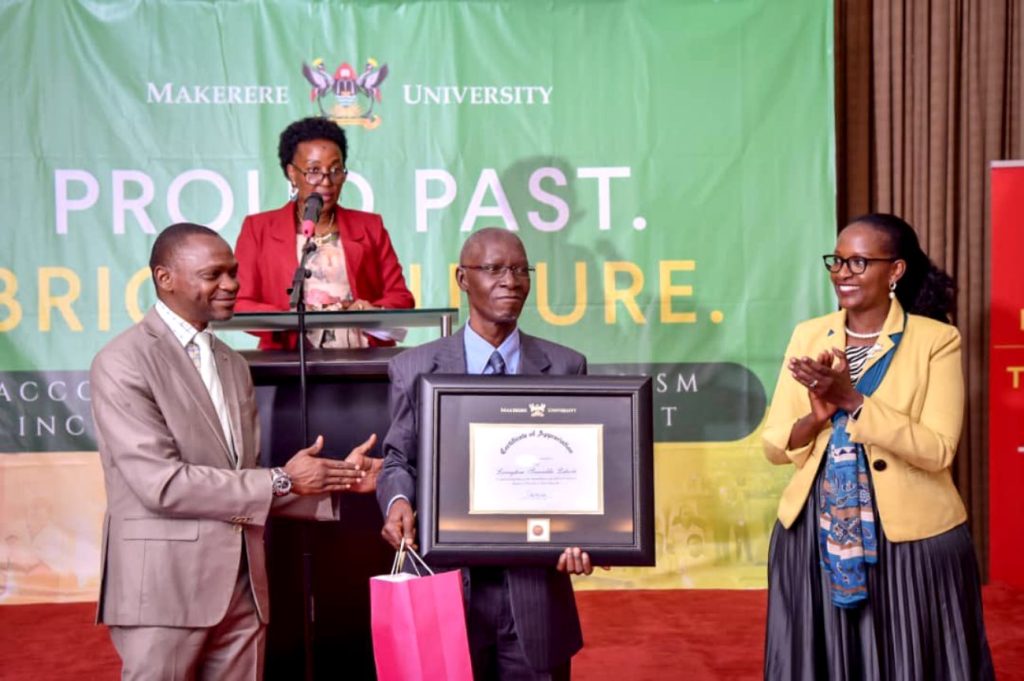
I did not feel bold and grounded enough. In a very calm tone, he looked at me straight in the eye, and requested me to give it a try and critique it. Since he would listen to our opinions or ideas, I suggested to him that I felt that fellow Professors or Senior academics would critique his work. He welcomed the idea and he requested me to provide the names of the Professors or Senior academics that I thought would critique his work. I provided five (5) names and he wrote them down. Professor Luboobi said, you have presented me with a team of experts and I will involve them at the next stage.
However, I have a team leader in front of me, gifted with the knowledge of identifying a team of experts, I would like such a person to critique my work. I must acknowledge that this was not a simple task, but I read his document and I provided my input.
He also requested for my written report about my vision of Makerere University. After reading it, he informed me that he had selected some ideas that would enrich his working draft. He convened a meeting involving the Professors or Senior academics that I had proposed as his team of experts and all the staff in the Office of the Vice Chancellor to enrich the strategic plan working document. Thereafter, he requested the Planning and Development Department to organize a retreat bringing onboard leaders of the different academic, administrative and research units to contribute ideas to the strategic plan of the University.
At the level of Administrative Assistant, Professor Luboobi mentored me, to understand and appreciate the roles of a Vice Chancellor, he involved me in key critical decision making processes, he nurtured my strategic planning potential; he linked me with experts in the different disciplines for mentorship; he entrusted me with managing team-building engagements in the Office of the Vice Chancellor, to mention, but a few.
Over the years, I have served as Communication Officer, Senior Public Relations Officer, and Principal Public Relations Officer of Makerere University.
The team in the Public Relations Office, will forever hold dear Professor Luboobi’s visionary leadership that streamlined the public relations function within the University. During his tenure as Vice Chancellor, Professor Luboobi championed the recruitment of more staff in the Public Relations Office, bringing on board Corporate Affairs, Web management, Branding and Marketing experts. By providing this strategic direction, he significantly contributed to the visibility of Makerere University at the national and global arena.
He was truly called to the teaching profession. He loved his work and served people with distinction and humility. He was selfless, dedicated and committed to duty throughout his life. He generously shared his vast knowledge and skills with humanity.
He was humane. He espoused the most important ethos of a true human being. He lived the ‘Obuntu’ style. In Luganda, ‘abadde musajja omuntumulamu, omwetowaze era ow’empisa.’
Professor Luboobi, I will forever remain eternally grateful to God that I crossed your path. You will always remain my mentor and role model. Thank you for impacting my life positively. Fare-thee-well.
Ritah Namisango is the Principal Public Relations and Communication Specialist at Makerere University.
You may like
-
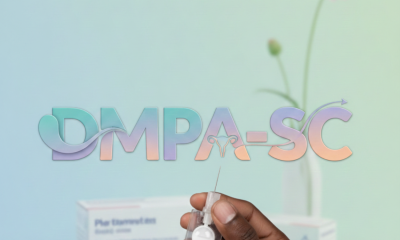

Study Alert: Power in Her Hands; Why Self-Injectable Contraception May Be a Game Changer for Women’s Agency in Uganda
-


For Youth by Youth – Call for Second Cohort Applications
-


Dr. Samalie Namukose and the Quiet Work of Making Nutrition Count
-


Press Statement: Makerere University Congratulates Former Staff and Students on Successful Election to Public Office
-
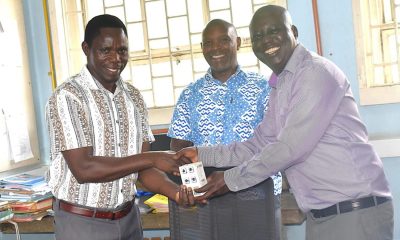

Dr Oruru Bosco Appointed Head of the Department of Physics
-
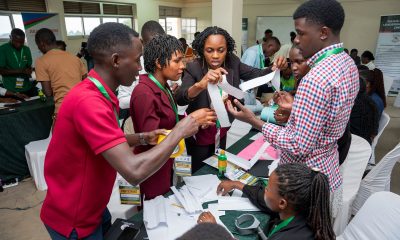

UNDP and JNLC hold training in Fort Portal: Participants equipped with skills in Advocacy and Gender Equality, Team Building, Inclusive Leadership, and Financial Literacy
General
Over 9,200 to graduate at Makerere University’s 76th Graduation
Published
12 hours agoon
February 24, 2026
Pomp and colour defined the opening day of the Makerere University’s 76th Graduation Ceremony as thousands gathered to celebrate academic excellence and new beginnings.
The historic ceremony has brought together scholars, families, friends and industry partners in a vibrant celebration of achievement and possibility. Throughout the four-day event, the University will confer degrees and award diplomas to 9,295 graduands in recognition of their dedication and hard work.
Among the graduates, 213 will receive Doctor of Philosophy (PhD) degrees, 2,503 will graduate with Master’s degrees, and 6,343 will earn Bachelor’s degrees. In addition, 206 students will graduate with postgraduate diplomas, while 30 will be awarded undergraduate diplomas.
Of the total number of graduands, 4,262 are female and 5,033 are male. According to Vice Chancellor, this marks the first time in 15 years that male graduands have outnumbered their female counterparts.
The best overall graduand in the Sciences, Esther Ziribaggwa, graduated on the opening day with the Bachelor of Agricultural and Rural Innovation and an impressive Cumulative Grade Point Average (CGPA) of 4.77.

The ceremony marks a proud moment for Makerere University as it continues to nurture top-tier professionals across diverse fields.
While presiding over the graduation, the State Minister for Primary Education, Hon. Dr. Joyce Moriku Kaducu, on behalf of the First Lady and Minister of Education and Sports, Hon. Janet Kataaha Museveni, pointed out that Makerere University is a model institution, where leaders are nurtured, scholars are sharpened, and where dreams have been given direction.
In her address, Hon. Museveni, highlighted Government’s deliberate investment in research, innovation, and infrastructure to strengthen higher education in Uganda.
“The establishment of the Makerere University Research and Innovation Fund (RIF), supports high-impact research and innovation that directly contributes to national priorities and development. Through this initiative, thousands of researchers and innovators have pursued practical, scalable solutions that are transforming communities and key sectors across Uganda,” Mrs Museveni, said.
The Minister also noted that Parliament’s approved a USD 162 million concessional loan to upgrade science, technology, and innovation infrastructure at Makerere University. The funding will facilitate the construction of modern laboratories, smart classrooms, and state-of-the-art facilities for Engineering and Health Sciences, investments expected to position the University firmly within the Fourth Industrial Revolution.
“Government has embarked on the construction of a National Stadium at Makerere University and other institutions of higher learning across the country. This will promote physical education, strengthen talent identification, and boost investment in the sports sector,”

Turning to the graduands, the Minister encouraged them to see themselves not merely as job seekers, but as job creators and solution-makers.
Uganda and Africa need innovators who will modernize agriculture; engineers who will build quality infrastructure; healthcare professionals who will strengthen health systems; and educators who will inspire the next generation,” the Honourable Minister said.
She reminded graduates that they are entering a rapidly changing world shaped by Artificial Intelligence, climate change, and shifting global markets. To thrive, she advised them to remain adaptable, creative, and committed to lifelong learning.
She also encouraged graduates interested in entrepreneurship to tap into the Government’s Parish Development Model, which provides community-based financing and production support.
Quoting Proverbs 3:5–6, the Minister urged the graduates to trust in God as they embark on their next chapter.
She extended special appreciation to the Mastercard Foundation for its 13-year partnership with Makerere University in expanding access to education and empowering young people in Uganda and beyond.
In his speech, the Chancellor of Makerere University, Dr Crispus Kiyonga, urged graduands to harness research, innovation and technology to drive Uganda’s transformation.

“This is a milestone in your lives. You have invested time, discipline and hard work to attain these qualifications. It is important that you derive value from this achievement, not only for yourselves, but for your families and for society.” Dr Kiyonga, said.
Dr. Kiyonga expressed gratitude to the Government of Uganda for its continued financial support to the University, particularly the funding allocated under MakRIF, which he described as critical in strengthening the institution’s research capacity.
“Research plays a very vital role in the development of any community. Makerere as the oldest University in the country is doing a significant amount of research, However, more work is required to mobilize additional resources to further strengthen research at the University.” Dr Kiyonga, noted.
Acknowledging the challenges of a competitive job market, Dr. Kiyonga encouraged graduates to think beyond traditional employment pathways.
“It is true that the job market may not absorb all of you immediately. But the knowledge you have acquired is empowering. You can create work for yourselves, individually or in teams.” Dr Kiyonga, said.
He advised the graduands to embrace discipline, integrity and adaptability in the workplace, and to take advantage of technology and digital platforms to innovate and respond to societal challenges.
“Every development challenge presents an opportunity. Believe that you can apply your knowledge to create solutions with impact.” He said.
Addressing the congregation, the Vice Chancellor, Prof Barnabas Nawangwe, congratulated the graduands, particularly staff and societal leaders on their respective achievements.

“I congratulate all our graduands upon reaching this milestone. In a special way I congratulate the members of staff, Ministers, and Members of Parliament that are graduating today as well as children and spouses of members of staff,” Prof Nawangwe, said.
In his speech, Prof Nawangwe, recognized outstanding PhD students, particularly members of staff. who completed their PhDs in record time without even taking leave from their duties.
He called upon graduates not to despise humble beginnings but rather reflect on the immense opportunities around them and rise to the occasion as entrepreneurs.
“You are all graduating with disciplines that are needed by society. We have equipped you with the knowledge and skills that will make you employable or create your own businesses and employ others. Do not despair if you cannot find employment. Instead, reflect on the immense opportunities around you and rise to the occasion as an entrepreneur,” Prof Nawangwe, said.
Prof Nawangwe called upon the graduands of PhDs to use their degrees to transform the African continent.
“As you leave the gates of Makerere I urge you to put to good use the knowledge you have received from one of the best universities in the World to improve yourselves, your families, your communities, your Country and humanity. Let people see you and know that you are a Makerere alumnus because of the way you carry yourself in society with dignity and integrity. Put your trust in God and honour your parents and opportunities will be opened for you,” Prof Nawangwe, said.
Delivering a key note address, Prof. Nicholas Ozor, the Executive Director of the African Technology Policy Studies Network Nairobi, Kenya ((ATPS). Reminded the graduates that a degree is not a finish line but the beginning of accountability. “The world is a complex, fast changing and deeply unequal. Degrees make you responsible for others not better than them,” Prof Ozor, said.

The 76th Graduation Ceremony of Makerere University will be held from Tuesday 24th to Friday 27th February, 2026. A total of 213 PhDs (87 female, 126 male), 2,503 Masters (1,087 female, 1,416 male), 206 Postgraduate Diplomas (80 female, 126 male), 6,343 Undergraduate Degrees (2,999 female, 3,344 male), and 30 Undergraduate Diplomas (9 female, 21 male) will be graduating from all the Colleges.
Ms. Sarah Aloyo and Ms. Nakato Dorothy both students of the Bachelor of Procurement and Supply Chain Management emerged as the best in the Humanities and Best Overall students with a CGPA of 4.93. Mr. Ssewalu Abdul, a Bachelor of Leisure and Hospitality Management student emerged second best in the Humanities with a CGPA 4.90. Ms. Esther Ziribaggwa emerged as the best student in the Sciences with a CGPA of 4.77 in the Bachelor of Agricultural and Rural Innovation, while Mr. Simon Mungudit emerged second best in the Sciences with a CGPA of 4.76 in the Bachelor of Science in Petroleum Geoscience and Production.
Commencement Speakers
- Day 1 – Prof. Nicholas Ozor, the Executive Director of the African Technology Policy Studies Network, Nairobi, Kenya
- Day 2 – Prof. Dr. Maggie Kigozi, Chairperson Makerere University Endowment Fund Board
- Day 3 – Dr. Patricia Adongo Ojangole, Managing Director, Uganda Development Bank Limited
- Day 4 – Ms. Reeta Roy, Former President & Chief Executive Officer, Mastercard Foundation
The 76th Graduation Ceremony will be held at the Freedom Square following the schedule below:
Tuesday, 24th February, 2026
College of Agricultural and Environmental Sciences (CAES)
College of Computing and Information Sciences (CoCIS)
College of Education and External Studies (CEES)
School of Law (SoL)
Livestream Link for Day 1: https://youtube.com/live/wVGPA0FJ9pU
Wednesday, 25th February, 2026
College of Health Sciences (CHS)
College of Natural Sciences (CoNAS)
College of Veterinary Medicine, Animal Resources and Bio-security (CoVAB)
School of Public Health (SPH)
Thursday, 26th February, 2026
Makerere University Business School (MUBS)
College of Business and Management Sciences (CoBAMS)
Friday, 27th February, 2026
College of Engineering, Design, Art and Technology (CEDAT)
College of Humanities and Social Sciences (CHUSS)
Institute of Gender and Development Studies (IGDS)
Makerere Institute of Social Research (MISR)
General
Mak Selected to Host Alliance for African Partnership Africa Office
Published
2 days agoon
February 23, 2026
Makerere University has been selected to host the Africa Office of the Alliance for African Partnership (AAP). The significant milestone that underscores Makerere’s role in fostering research, innovation, and global collaborations across the continent was announced at a meeting of the University’s Central Management with an AAP delegation on 23rd February 2026.
Makerere’s selection was based on the University’s robust commitment, alignment with the AAP’s Strategic Plan, and proven ability to manage consortium activities. The AAP, which was initiated by Michigan State University (MSU) in collaboration with Ten African Universities and agricultural policy research networks in 2016, targets critical challenges in education, youth empowerment, health and nutrition, agri-food systems, science and technology, water, energy, environment, and culture and society.
Addressing the delegation consisting of AAP Co-Directors from MSU, Dr. Jose Jackson-Malete and Dr. Amy Jamison, accompanied by newly-appointed Director of the AAP Africa Office, Dr. Racheal Ddungu Mugabi and Ms. Clare Cheromoi, the Vice Chancellor, Prof. Barnabas Nawangwe who appreciated the choice of Makerere to host the Africa Office said:
“One of the greatest challenges facing African universities is PhD training, particularly supervisory capacity. Through partnerships such as the Alliance for African Partnership we can leverage international expertise to strengthen supervision—whether through training supervisors or through joint supervision arrangements.”
Prof. Nawangwe equally applauded joint initiatives such as the Grant Writing and Publication project, which gave rise to the establishment of a Writing Centre that he said can be used to build capacity in AAP member universities with Makerere as the hub. Officially launched on 21st March 2023, the project is living up to its expectation of becoming a springboard for strong postdoctoral collaborative research for both institutions and other US universities.
Dr. Titus Awokuse, Vice Provost and Dean for International Studies and Programs at Michigan State University (MSU) who attended virtually, reiterated that Makerere’s selection reflects its long-standing commitment to advancing African higher education, research excellence, and meaningful global collaboration.
Reflecting on the origins of the Alliance for African Partnerships (AAP), Dr. Awokuse explained that nearly a decade ago, MSU initiated a transformative conversation in Atlanta centered on the question: How should we partner differently? From this dialogue emerged AAP—an Africa-centered consortium that now brings together 12 institutions across Africa and the United States.

He emphasized that AAP is grounded in equity, mutual benefit, shared leadership, and deep respect for African priorities and expertise. Since its founding, MSU has served as convener and key supporter, working with member institutions to strengthen research collaboration, promote faculty and student engagement, and address shared development priorities.
Dr. Awokuse underscored that AAP’s success is the result of collective vision and commitment, not the efforts of a single institution. He paid tribute to Lilongwe University of Agriculture and Natural Resources for hosting the Africa Office in its early years and acknowledged the foundational leadership of the inaugural Africa Office Director.
He described the launch of the Africa Office at Makerere University as a significant milestone that reinforces Africa-led leadership, strengthens regional collaboration, and enhances responsiveness to emerging opportunities. MSU, he affirmed, remains fully committed to AAP and to working closely with Makerere and all consortium partners to expand collaborative research, nurture the next generation of scholars, and advance Africa-led solutions to global challenges.
The newly-appointed AAP Africa Office Director, Dr. Racheal Ddungu Mugabi is a member of faculty in the Department of Development Studies, Institute of Gender and Development Studies. Her work on intersectional inequalities in Uganda and other Global South regions uniquely positions her to drive collaborative research and partnerships at the Africa Office.
Initially founded by ten African Universities and MSU, AAP now comprises eleven African members including; the African Network of Agricultural Policy Institutes (ANAPRI)-Zambia, Egerton University-Kenya, Lilongwe University of Agriculture and Natural Resources (LUANAR)-Malawi, Makerere University-Uganda, United States International University-Africa-Kenya, Universite Cheikh Anta Diop-Senegal, Universite Yambo Ouologuem de Bamako-Mali, University of Botswana-Botswana, University of Dar es Salaam-Tanzania, University of Nigeria, Nsukka-Nigeria, and the latest, University of Pretoria-South Africa.
These Universites collaborate under Focal Points to advance policy-relevant research and sustainable development. Makerere University’s Focal Point is Prof. Robert Wamala, Director of Research, Innovations and Partnerships (DRIP).
Addressing the University Management, Dr. Jackson-Malete outlined the African Futures Research Leadership Program, which nurtures early career scholars through mentorship and skill-building as one of AAP’s flagship programs. She noted that the Program that prioritizes female participants or men committed to promoting women in higher education has for the first time during its fifth cohort admitted the first male, Dr. Alfadaniels Mabingo from the Department of Performing Arts and Film, Makerere University.
The AAP Africa Office at Makerere will coordinate activities, boost research collaboration, mobilize resources, and enhance global engagements for socio-economic transformation. This aligns with Makerere‘s broader goals of leveraging international expertise to build resilient institutions.
View more photos from the event: https://flic.kr/s/aHBqjCLjoA
Trending
-

 Humanities & Social Sciences2 days ago
Humanities & Social Sciences2 days agoMeet Najjuka Whitney, The Girl Who Missed Law and Found Her Voice
-

 Health7 days ago
Health7 days agoUganda has until 2030 to end Open Defecation as Ntaro’s PhD Examines Kabale’s Progress
-

 Agriculture & Environment5 days ago
Agriculture & Environment5 days agoUganda Martyrs Namugongo Students Turn Organic Waste into Soap in an Innovative School Project on Sustainable Waste Management
-

 General7 days ago
General7 days agoMastercard Foundation Scholars embrace and honour their rich cultural diversity
-

 Health2 weeks ago
Health2 weeks agoCall for Applications: Short Course in Molecular Diagnostics March 2026
